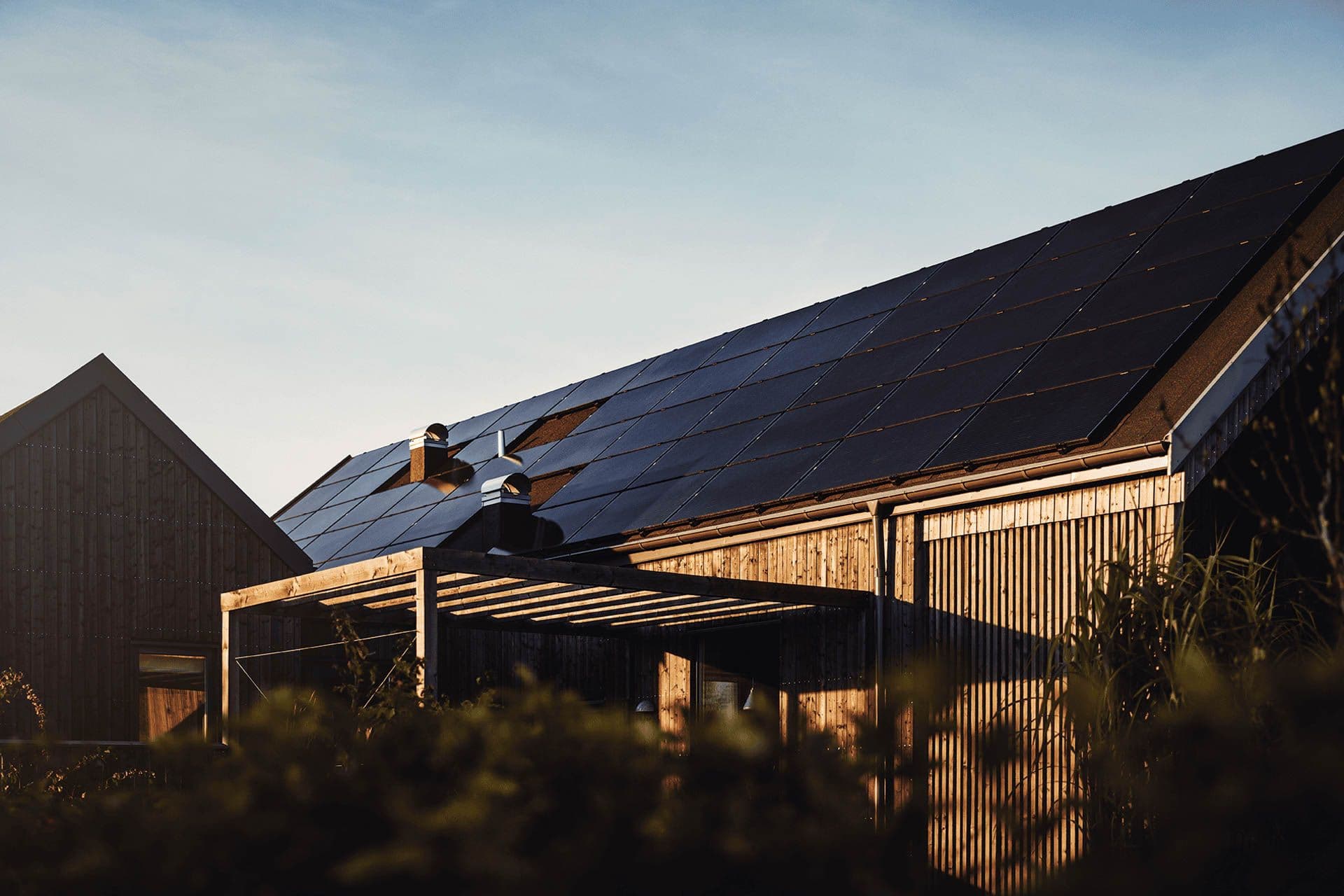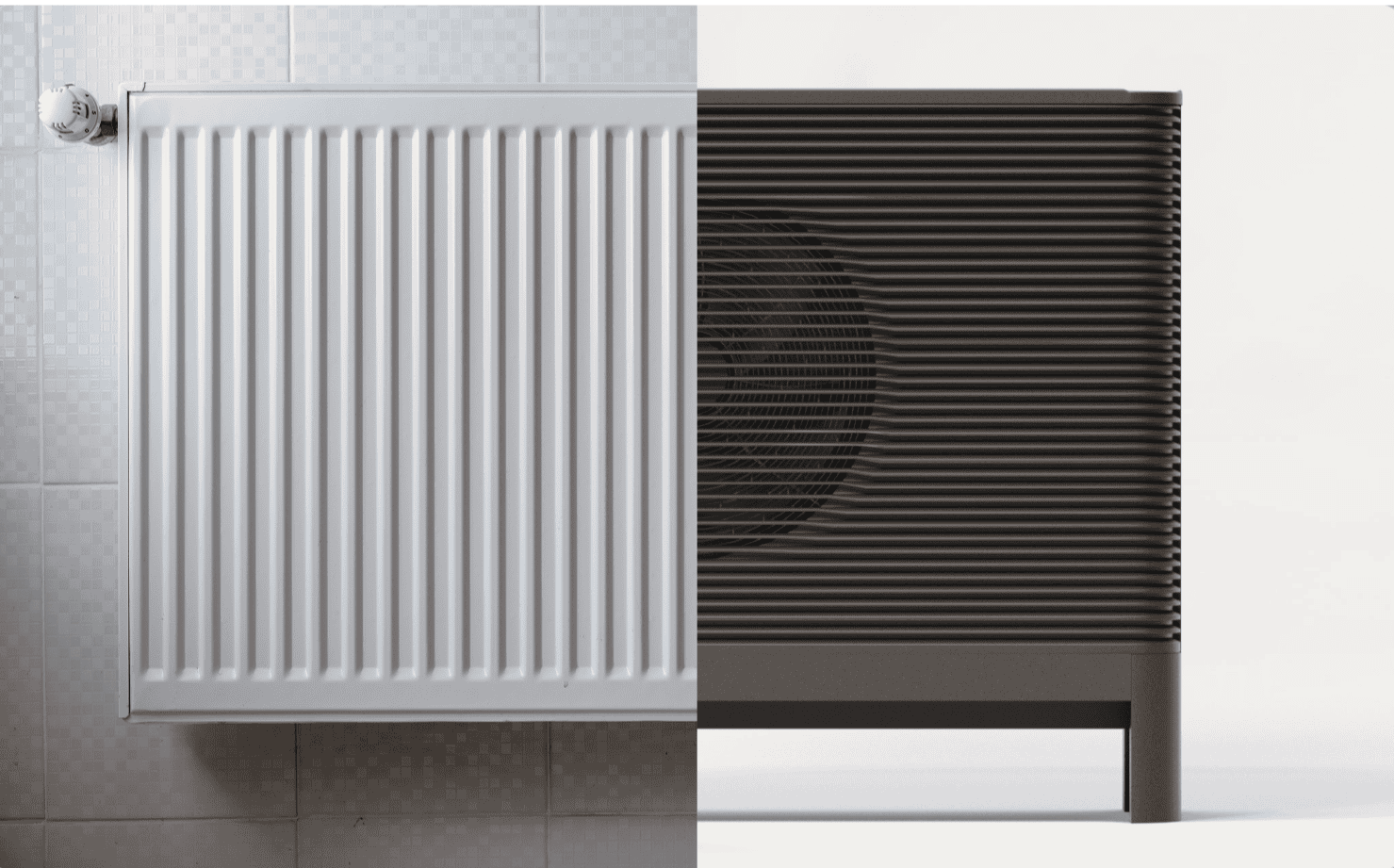Key takeaways
- Heat pumps work very efficiently with radiators, but since they operate at lower flow temperatures compared to traditional boilers, adjustments or upgrades to your radiators may be necessary.
- Larger radiators with bigger surface areas maximise heat pump efficiency.
- Paired with suitable radiators, heat pumps lower energy bills and reduce home heating CO₂ emissions compared to fossil fuel-based systems.
During chilly winter days, nothing is more synonymous with British home heating than the classic radiator. But can modern heat pump technology work in tandem with these age-old heat emitters?
We explore the factors crucial to combining radiators with air source heat pumps, such as the radiator's heat output and size. We also explain the energy efficiency enhancements that may be required to get the most out of your clean energy heat pump.
How do heat pumps work?
Before we get into heat pump radiators and how much bigger they need to be, it’s important to understand how a heat pump works.
Heat pumps operate using a refrigeration cycle to move heat from one area to another, rather than generating heat from a combustion process like traditional gas boilers. Air source heat pumps, for example, extract heat from the outside air, even in colder temperatures.
A refrigerant fluid captures this ambient heat and is then compressed, raising its temperature. The heated refrigerant is circulated through a heat exchanger, where it transfers its heat to your home's heating system – whether that be radiators, underfloor heating, or a fan coil unit.
Heat pumps and radiators: do they work together?
Do heat pumps work with radiators? Of course, they do. But, integrating them with existing radiators in some homes can present certain challenges.
Why? Because traditional radiators are designed to work effectively with higher-temperature heating systems, such as gas or oil-fired boiler heating systems. As a result, if you’re switching to a heat pump, which operates at lower flow temperatures for better efficiency, you need to take into account whether your current radiators can accommodate this.
Heat pumps and radiators: what are the compatibility issues?
As we’ve just touched on, heat pumps are at their most efficient when providing heated water at lower flow temperatures, usually around 35°C to 45°C. However, a lot of traditional radiators may require flow temperatures of around 65°C to heat a room adequately.
It’s not their fault, they were simply built that way. But it’s this temperature mismatch that means that heat pumps may struggle to provide enough warmth, or may need to run for longer periods, with some smaller or traditional radiators. And this means less efficiency, which, in turn, means lower energy cost savings.
Addressing the compatibility issues between heat pumps and tradiational radiators
When it comes to combining heat pumps with radiators, a few compatibility issues should be addressed to ensure an efficient heating system. From installing more or larger radiators to alternative heating distribution systems, such as underfloor heating, let’s get into them.
1. Type of radiator
One key consideration is the type of radiator you need for an efficient heat pump system. For example, traditional cast iron radiators may not perform well because they are designed for high-temperature systems and take longer to heat up and cool down.
That’s why we often recommend aluminium or modern steel panel radiators. They are known for their responsiveness and high thermal conductivity, making them more suitable for the lower temperatures supplied by heat pumps.
You could also opt to switch your radiators out for an underfloor heating system. Although more costly to install, these hidden systems work wonderfully well with heat pumps due to their surface area and compatibility with lower flow temperatures.
2. Size of radiator
There’s technically no such thing as a “heat pump radiator”. There are, however, radiators that work more efficiently with heat pumps. These include larger radiators that have a larger surface area to accommodate the lower flow temperatures at which heat pumps operate.
How much bigger do heat pump radiators need to be? To answer that, let’s look at the various size type radiators that are typically used in home heating systems:
- P1 (Type 10): 1 radiator panel, no convection fins.
- K1 (Type 11): 1 radiator panel, 1 set of convection fins.
- P+ (Type 21): 2 radiator panels, 1 set of convection fins.
- K2 (Type 22): 2 radiator panels, 2 sets of convection fins.
- K3 (Type 33): 3 radiator panels, 3 sets of convection fins.
The more panels and fins a radiator has, the more surface area it provides for heat exchange, meaning it can deliver more heat at lower flow temperatures. Due to their size, we typically install K2 radiators with our Aira Heat Pump systems, but if a room has a very high heat demand, we use a K3.
Learn more about how big heat pump radiators need to be.
3. Model of radiator
Armed with the knowledge that size and type of radiator are important, which companies provide radiators that work well with heat pumps?
We typically recommend Centerbrand or Myson radiators as the best radiators for heat pumps. If design matters to you, we’ve installed Eskimo radiators in homes like Gareth’s, though we’re happy to fit any radiator model that meets the requirements of our heat loss calculation.
4. System design
Beyond choosing the right radiator type, model and size, the design of the hot water distribution system itself is also important. For example, for peak heat pump efficiency, pipes connecting to radiators need to be correctly sized to manage a higher flow of lower-temperature water that’s essential for heat transfer.
In some cases, setting up a heat pump system may require more than modifying existing pipework. Additional components compatible with lower flow temperatures might be necessary to ensure optimal performance.
However, our Clean Energy Technicians are well-versed with technical installs and will design your heat pump system to work seamlessly with your existing heating system, with minimal modifactions. This includes installing a heat pump with micropore piping.
All of our technicians are trained at the Aira Academy. This specialised approach ensures that every heat pump system we install is perfectly set up to maximise performance, efficiency and reliability. We will always be open and honest about what - if any - system upgrades you require to get the most out of your heat pump.

Choosing the right radiator for your heat pump: why a heat loss calculation matters
To heat a home effectively with a heat pump, the radiator output needs careful balancing with your home's specific needs. Since heat pumps operate at lower flow temperatures than traditional boilers, radiators must emit enough heat to maintain comfort. The required output is measured in British Thermal Units (BTUs) or Watts per hour, ensuring radiators have the right capacity to warm each space.
To achieve this balance, we conduct a heat loss calculation for each room before designing your heat pump system. This calculation considers factors like room size, insulation and window types to determine the ideal radiator size and type. To guide our decision-making, we also take into account a radiator's 'Delta T' rating, which reflects its design operating temperature range.
This tailored approach ensures maximum efficiency and comfort, using radiators that meet the heat demands specific to your home.
Optimising radiators for heat pump efficiency
Enhancing energy efficiency is at the core of a great heat pump installation, and fine-tuning your radiator setup plays a big role. Here are some simple ways to make sure your radiators help your heat pump perform at its best:
- Radiator reflector panels: Placed behind radiators, these panels reduce heat loss through exterior walls.
- Thermostatic radiator valves (TRVs): TRVs offer room-specific temperature control, helping you save energy. If you have a heat pump, we recommend keeping all your thermostatic radiator valves open except in rooms where you regularly want cooler temperatures, like bedrooms.
- Maintenance: Regular upkeep, like bleeding your radiators, keeps things running smoothly. Balancing radiator flow ensures even heating throughout the home.
- Home insulation: Good insulation keeps heat inside, which is especially valuable for older homes. This allows radiators to be more effective, even at lower temperatures.
Pros and cons of using radiators with heat pumps
Pairing a heat pump with radiators brings a variety of benefits. But there are a few potential drawbacks.
On the plus side, heat pumps can greatly lower a home’s carbon footprint by using clean energy rather than fossil fuels. They are also far more energy-efficienct than traditional gas boilers and, therefore, cost less to run.
But there are some technical factors to keep in mind – like whether your existing radiators can handle the lower temperatures heat pumps operate at. Exploring these points can help determine if your current heating system needs additional tweaks and whether a heat pump is the right option for you.

Advantages of using radiators with heat pumps
When paired with the right type of radiator, such as larger or aluminium models, one of the key advantages of installing a heat pump is the potential for substantial energy efficiency. Unlike traditional gas boilers, heat pumps do not generate heat; they move it from one place to another, which typically consumes less energy. This means heat pumps can reduce energy bills by up to 33%.
Let’s delve into the benefits that come with using radiators in conjunction with heat pump technology:
- Energy savings: Heat pumps operate using electricity and can be incredibly efficient, particularly when combined with low-temperature radiators. This can lead to reduced energy costs over time.
- Reduced carbon footprint: As heat pumps can be powered by renewable electricity sources, this setup reduces dependence on fossil fuels, promoting a more sustainable living environment.
- Compatibility: In many cases, existing radiator systems can be adapted to work with heat pumps, which can save homeowners the cost and hassle of a complete heating system overhaul.
- Consistently cosy indoor temperatures: With the proper sizing and type of radiators, a heat pump system can adequately maintain a comfortable and steady indoor temperature at a lower operating cost than a gas boiler.
Disadvantages of using radiators with heat pumps
Despite the benefits, there are some challenges associated with using radiators with heat pump systems. Mainly, these issues arise due to the lower flow temperatures that heat pumps generate compared to traditional boilers. Here is a breakdown of the drawbacks:
- Upfront costs: Adapting or replacing existing radiators to suit the lower temperatures of heat pumps can impose additional initial costs. Some may require larger or more efficient models for adequate heating. However, with various heat pump grants available in the UK, these upfront costs have never been lower.
- Retrofitting challenges: Older homes with existing radiators may encounter difficulties integrating them with a heat pump system, especially if the home has poor insulation or the existing radiators are too small.
- Aesthetics and space: Larger radiators or even multiple radiators may be necessary to achieve the required heat output, which could impact the aesthetic appeal and available space in smaller rooms.
- Complex system design: Sizing and designing a radiator and heat pump system for optimal performance and efficiency requires professional expertise, which is crucial but also adds to the complexity and cost of the project.
In summary, while heat pumps and radiators work well together and offer great environmental and cost savings, it's important to consider factors like the type and size of your radiators, along with your home’s insulation and layout, to get the most out of the system.
Take a look at our in-depth comparison of air source heat pumps vs gas boilers to see which system is right for you.
What type of house do you live in?
Keep learning
Similar articles to expand your knowledge

Published today
Carl RobinsonThe Warm Homes Plan: what it really means for your energy bills
The UK’s new Warm Homes Plan confirms one thing: the future of cheaper energy is clean, electric homes. Here’s what the plan really means for homeowners. And how heat pumps, solar and home batteries can cut your bills long before 2030.

Published at 15 Jan 2026
Carl RobinsonIs a heat pump ideal for your semi-detached home?
Think heat pumps are only for large detached homes? In reality, semi-detached houses are perfectly suited to them. We delve into why heat pumps work so well in these homes and whether yours is ready for the swtich.

Published at 6 Jan 2026
Carl RobinsonSolar panels with home battery storage: is it worth it?
Solar panels generate free, 100% clean energy, but a home battery is what helps you use more of it. By storing excess solar power for later, battery storage can make solar far more effective. Here’s why solar and batteries belong together. And where Aira fits in.

Published at 19 Dec 2025
Carl RobinsonIs a heat pump ideal for your single-family detached home?
If you own a single-family detached home, you’re already in a strong position to switch to a heat pump. With full control over your space, insulation and energy use, heat pumps can deliver lower bills, steadier comfort and lower emissions all year round. Here’s what to know about performance, costs and everyday life with a heat pump in a single-family detached home.

Published at 17 Dec 2024
Carl RobinsonHeat pump efficiency explained: When is a heat pump most efficient and why
Heat pumps are the most efficient way to heat a UK home and are typically 4 times more efficient than a gas boiler. But what actually drives that efficiency? And when do heat pumps perform at their best? This guide breaks it down simply, from COP and SCOP to the real factors that shape performance.

Published at 2 Dec 2025
Carl RobinsonDo heat pumps work in older homes?
Thinking heat pumps are just for new builds? Think again. Many older homes can run a heat pump efficiently and affordably – cutting energy bills, reducing carbon emissions, and future-proofing your home. Just as a heat pump in a newbuild home would.

